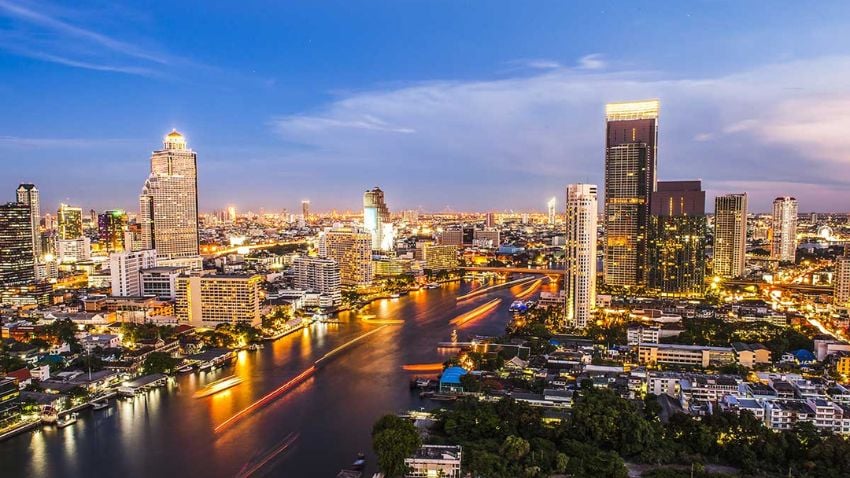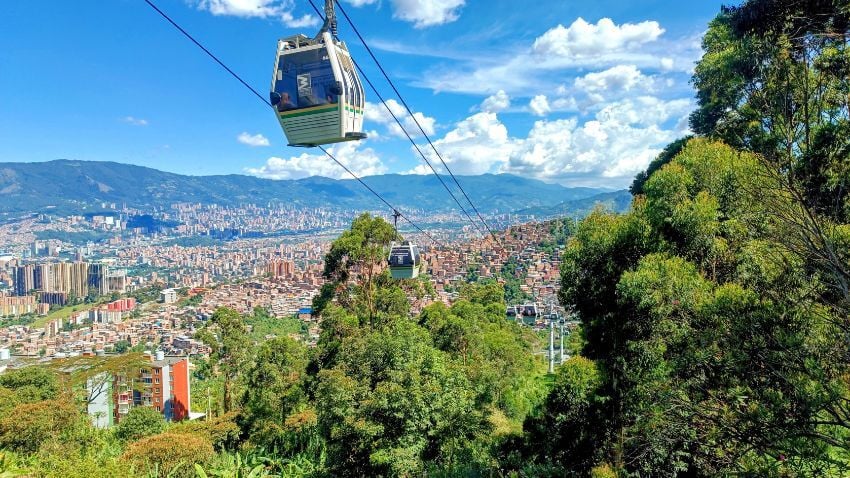Best Places In Colombia For Expats In 2026
Colombia continues to move up the radar for people looking to live better, spend less, and build international optionality. With improving...

5 min read
Thailand, often referred to as the Land of Smiles, is Southeast Asia’s most visited country and is a second home for many expats and retirees. Many expats and tourists know Thailand because of the beautiful beaches and popular cities like Bangkok and Chiang Mai. Thailand is one of few countries in Asia that has begun offering a long-term visa for digital nomads and remote employees who want to spend an extended period in Thailand. This visa will allow foreigners to call Thailand home for up to 10 years after they receive approval. The application requirements are a bit more challenging, but it is well worth it if you qualify for this visa and are interested in Thailand.
The process to secure this visa is designed to be accessible and streamlined. Aspiring digital nomads can find detailed information on the criteria, required documents, and application steps through official channels. The government's commitment to fostering a digital-friendly environment is evident in the simplicity of the application process.

The Emerald Pool in the Thung Teao Forest Natural Park
Thailand’s new visa for digital nomads will allow them to live in Thailand for up to 10 years. This feature makes Thailand’s digital nomad visa stand out relative to other global digital nomad visa programs, which typically only allow expats to stay for 12 months. However, applicants still need to pay yearly fees to renew their digital work permit.
The digital nomad program targets wealthy expats from Europe and other regions already familiar with Thailand and wants to take advantage of the lifestyle, outdoors, and lower cost of living. There are also special tax incentives, as digital nomads will only have to pay a 17% tax rate instead of a 35% tax rate. Since the program is new, it is not clear if you will have issues renewing your annual digital work permit if you spend six months or less in Thailand and are not a tax resident.
To qualify for this digital nomad visa, individuals typically need to meet certain criteria, showcasing their status as remote workers or entrepreneurs engaged in online business activities. The benefits extend beyond just legal stay; digital nomads gain the opportunity to immerse themselves in the unique blend of Thai culture, while continuing their professional pursuits.
The past legal framework for remote employees was very unclear, and many people were illegally working as digital nomads on tourist visas. In the past, many people often had to resort to renewing visas or going on visa runs to stay in Thailand long-term. This new visa provides new legal clarity and economic support for Thailand’s economy, which heavily depends on tourists and long-term residents.
Related content: Thailand Immigration - How To Get Residency In Thailand

Tiger Cave in Krabi Town, Thailand
Thailand is an excellent hub for digital nomads and remote employees that want to take advantage of the country’s natural beauty, culturally rich cities, and lower cost of living. Thailand is already a top-rated destination for retirees from places like Europe and digital nomads who visited Thailand as tourists. Although major cities like Chiang Mai and Bangkok are more expensive, Thailand is still affordable for most expats and often cheaper than options in other low-cost destinations like Eastern Europe. Most people in Thailand make less than $1,000 USD/month, and the country’s minimum wage is slightly under $300 USD/month.
When most people think of Thailand, the first thing that comes to mind may be islands and beach destinations such as Koh Samui, Phuket, Krabi, and Koh Chang. All these destinations are easily accessible by bus or flight for people based in Bangkok or other large cities in Southern Thailand. However, Thailand is also an excellent destination for people who like hiking and the outdoors, as the country also has over 100 national parks. Expats who prefer the mountains and colder climates may find destinations like Chiang Mai or Chiang Rai more appealing.
Digital nomads often rely on a range of tools, from laptops and phones to computers, to conduct their business remotely. Thailand recognizes the importance of reliable internet and efficient communication, making cities like Bangkok, the capital, particularly appealing with its modern infrastructure and vibrant business environment.
Thailand's bustling cities, known for their rich cultural heritage and modern amenities, provide an ideal backdrop for digital nomads. The sense of community among like-minded individuals further enhances the experience, creating opportunities for collaboration, networking, and shared learning.
Related content: Keep An Eye Out For The Upcoming Digital Nomad Visa In Indonesia

The Phi Phi Islands
Although this visa was not created exclusively for digital nomads, it is an excellent fit for digital nomads and provides flexibility for applicants. While the minimum income requirement is generally $80,000 USD annually, this amount may be lower if you have other qualifications. Some people may also be able to apply based on their education, industry experience, or ability to raise funds for their company. There are multiple types of qualifications for people to apply for this visa:
Wealthy global citizens: This group must prove that they have at least $1 million in assets or show that they made $80,000 USD/year during the past two years. These income requirements are higher than other digital nomad visa programs but still within reach for many.
Wealthy pensioners: These individuals must prove that they have an income of $80,000 USD. They may also be required to purchase bonds or real estate if their income is lower.
Remote Workers: These individuals must prove they made between $40,000-80,000 USD/year. Individuals with a master’s degree only need to prove that they made $40,000 USD/year during the past two years.
Highly Skilled Professionals: This group can include highly skilled workers deemed essential by the Thai government, including education or other industries.
It is best for digital nomads to take advantage of the Remote Worker or Highly Skilled Professionals options. Applications with particular work experience or educational background may receive an edge when applying and not have to prove that they make $80,000 USD/year.
Related content: The Basics Of How To Get A Second Passport Or A Second Residency.

Kanchanaburi, Thailand
The documentation requirements vary depending on the visa program you apply for. The Work from Thai Professionals need to submit the following:
Once applicants submit everything online, they should hear back within 20 days. Qualified applicants will then be requested to apply for a Long Term Residence Visa at a Thai Embassy or Consulate. The cost of issuing this 10-year multiple-entry visa is 50,000 BAHT ($1,318 USD). Once applicants reach the country, they must apply for the Digital Work Permit, which costs around $79 USD/year. Other legal notifications are posted in Thai on the government website.

Bangkok, Thailand
As the world adapts to the changing landscape of work, Thailand's new visa for digital nomads stands as a testament to the country's forward-thinking approach. It not only addresses the practicalities of remote work but also invites a global community to experience the vibrant tapestry of Thai life while pursuing their professional aspirations.
Digital nomads and remote employees can easily take advantage of this new program, which allows them to live in Thailand for up to 10 years. Applicants are assessed based on their income, technical skills, and educational background, so people who make less than $80,000 USD/year can still qualify for this visa. This visa is unique in the region and provides legal clarity and a long-term solution to living and working in Thailand. There are only several other clear options available in Asia, including Taiwan, so this is a noteworthy program to consider if you are a digital nomad and want to live in Asia. Thailand also offers permanent residency if you end up loving it there so much.
If you want the best intel from the expat world, including profitable offshore opportunities, little-known tax-saving strategies, and hard-won insights on immigration, passports, and Plan-B residencies, all delivered to your inbox every single week, then join our daily correspondence, EMS Pulse®. Currently enjoyed by over 84,000 expats and expat-hopefuls worldwide. Fill in the form below to join our newsletter free:

Written by Mikkel Thorup
Mikkel Thorup is the world’s most sought-after expat consultant. He focuses on helping high-net-worth private clients to legally mitigate tax liabilities, obtain a second residency and citizenship, and assemble a portfolio of foreign investments including international real estate, timber plantations, agricultural land and other hard-money tangible assets. Mikkel is the Founder and CEO at Expat Money®, a private consulting firm started in 2017. He hosts the popular weekly podcast, the Expat Money Show, and wrote the definitive #1-Best Selling book Expat Secrets - How To Pay Zero Taxes, Live Overseas And Make Giant Piles Of Money, and his second book: Expats Guide On Moving To Mexico.

Colombia continues to move up the radar for people looking to live better, spend less, and build international optionality. With improving...

More than two weeks have passed since I saw a photo of Nicolás Maduro in Nike pyjamas, after being captured by U.S. special forces and flown to New...
%20it%20must%20be%20notarized%20by%20a%20Panamanian%20Notary.jpg)
Latin America is one of the best regions in the world to build a solid Plan-B. It sits far from major geopolitical flashpoints, is largely insulated...